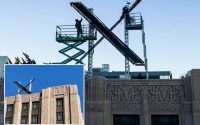How Silicon Valley Bank bailout will hurt US bank customers
Experts are warning that US bank customers will face a financial burden from a Biden administration-approved bailout of Silicon Valley Bank — despite assurances from President Biden that taxpayers won’t be responsible for the bill.
In an extraordinary move, the feds announced plans Sunday to use the Federal Deposit Insurance Corp.’s Deposit Insurance Fund (DIF) to cover all deposits at the doomed SVB and another failed firm, Signature Bank in New York, with “no losses” incurred by taxpayers.
President Biden insisted that taxpayers wouldn’t be burdened in his Monday speech on the crisis.
However, if the banking crisis escalates and the DIF’s reserve runs dry, taxpayers would be on the hook for the difference, experts told The Post.
Even if it does not come to that, the FDIC-insured banks that fund the DIF through quarterly payments are likely to pass along their costs to customers.
“The Deposit Insurance Fund is not really an insurance fund,” William Luther, director of the American Institute for Economic Research’s Sound Money Project, told The Post. “It is a rainy-day fund, which gets drawn down following a bank failure and replenished thereafter.”
“Although the statutory incidence of these taxes falls on banks, they pass along some of the cost to their customers in the form of higher fees and lower-quality services,” Luther added.

Aside from outright fees, embattled banks could pass along their costs in ways that are “harder to see” but would still impact customers, such as reducing their number of tellers in local branches to cut down on costs, Luther added.
“If policymakers believe the benefits of this bailout exceed the costs, they should say so,” Luther added. “Instead, they tell us that everyone will be made whole and no one will have to pay for it. The math just doesn’t check out on that one.”
Follow The Post’s coverage of Silicon Valley Bank’s collapse
The extra fees would be nothing new. Luther noted that the FDIC warned banks in a 2012 letter that it had received a “number of complaints from depositors” who grumbled about being hit with a bill for “FDIC Insurance Premiums” or “assessments.”
“While IDIs are not prohibited from passing the costs of deposit insurance on to customers, the FDIC discourages institutions from specifically designating that a customer fee is for deposit insurance or from stating or implying that the FDIC is charging such a fee,” the FDIC letter said at the time.
As of the end of last year, the Deposit Insurance Fund had a balance of $128.2 billion. By comparison, SVB alone had roughly $156 billion in unsecured deposits, according to company filings.

The feds will also sell off the remaining assets of SVB and Signature Bank as part of their bid to make depositors whole.
Regulators opted to take action to prevent a nationwide run on banks that could cause a systemic meltdown in the banking sector. Despite the preventative measures, regional bank stocks still plunged in early Monday trading.
The intervention went above and beyond the FDIC’s rules, which guarantee deposits up to $250,000 per account. Had officials followed the pre-existing terms, the tech investors and venture firms that comprised most of SVB’s customer base would have been out of luck.
US banks are unlikely to hit customers with upcharges in the form of new ATM fees or overdraft fees, MIT economist Simon Johnson told The Post. Since the banking sector is so competitive, customers could simply seek out a better deal.

Still, the Deposit Insurance Fund is “ultimately backed by the taxpayer” — meaning Americans would have to cover any shortfall.
“That’s why you can have a DIF of $100 billion that backs, right now, $10 trillion in insured deposits. If the DIF were short of money, the commitment is to go out and levy it from banks and obviously from bank customers and fill any gap,” Johnson said.
“The government and the taxpayer is the backstop, and it’s a very powerful backstop, but I wouldn’t say, it’s not my words to say, that Americans won’t eventually be hit with a bill,” he added. “Insurance premiums on bank accounts are going to go up, because they will be insuring all deposits.”
Former US Rep. Justin Amash (I-Mich.) expressed a similar view.
“A bailout creates a moral hazard, even if it’s *just* a bailout of depositors at a bank; it doesn’t fix—but instead exacerbates—the systemic problem. And the public is always on the hook for any Fed program, no matter how much government insists costs won’t be borne by taxpayers,” Amash tweeted.


